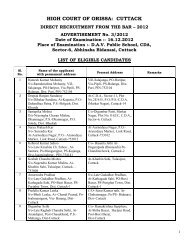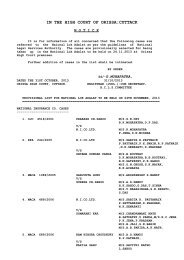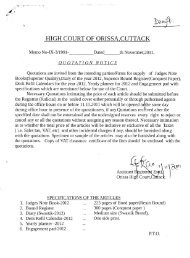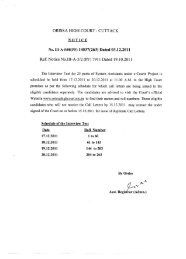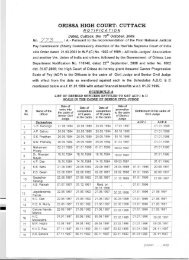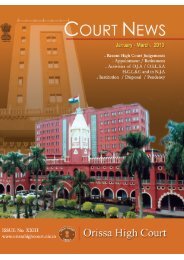ORIGINAL JURISDICTION - Orissa High Court
ORIGINAL JURISDICTION - Orissa High Court
ORIGINAL JURISDICTION - Orissa High Court
Create successful ePaper yourself
Turn your PDF publications into a flip-book with our unique Google optimized e-Paper software.
97<br />
and the parties to the lease are governed by the provisions of the Transfer<br />
of Property Act. In the instant case, the lease was cancelled on the<br />
allegation that Clauses-9 of the lease deed was violated by the lessee.<br />
However, nothing was brought before this <strong>Court</strong> that there were materials<br />
before the Collector to come to the conclusion that the said clause has been<br />
violated. It is an admitted position that the Lease Renewal Case No.11 of<br />
1972 was initiated for renewal of the lease during pendency of which the<br />
INDIAN LAW REPORTS, CUTTACK SERIES [2010]<br />
Resumption Proceeding No.6 of 1975 was suo motu registered by the<br />
Collector and no notice of the said resumption case was served on the<br />
respondent before passing the final order, which action was questioned in<br />
the suit. The Khasmahal lease was a registered lease. Applying the ratio of<br />
the aforementioned case laws, there can be no dispute that the provisions of<br />
the Transfer of Property Act are applicable to a Khasmahal lease and the<br />
property in a Khasmahal lease shall be treated to be akin to a private land of<br />
the lessee, which is both heritable and transferable. Though Clause-15 of<br />
the lease deed, as quoted above, provides the modalities for determination<br />
of lease by the Collector, the State, as defendant, has brought no materials<br />
before the trial court to show that such determination of lease made by the<br />
Collector was in accordance with Clause-15 of the lease deed. In the case<br />
of Sourindra Narayan Bhanja Deo –v- Member, Board of Revenue,<br />
<strong>Orissa</strong> and others, 2004 (II) OLR 332, this <strong>Court</strong> was considering the<br />
legality of determination of a Khasmahal lease in a resumption proceeding.<br />
The facts of the said case are similar to the present case. Referring Sub-<br />
Rule (5) of Rule -28 of Bihar and <strong>Orissa</strong> Government Estates Manual, 1919<br />
and the earlier decisions of this <strong>Court</strong>, it was held that Clause-18 of the<br />
lease deed provides that on expiry of lease the lesser shall, if the lessee has<br />
duly observed and performed all the conditions of the lease, be bound at the<br />
option of the lessee to renew the lease for a further period of 30 years. In<br />
other words, the option of renewal has been left with the lessee and not with<br />
the Khasmahal authorities. Since material has been brought before the<br />
<strong>Court</strong> that such a renewal application was pending, the said application<br />
could not have been rejected otherwise than finding that the lessee has not<br />
duly observed and performed all the conditions of the lease. The State has<br />
not brought any material to show that there was any specific public purpose<br />
for which the aforesaid land was required as provided in Rule 28 of the<br />
Bihar and <strong>Orissa</strong> Government Estate Manual, 1919. The power of<br />
presumption provided to the Khasmahal authority is under the said Rule 28,<br />
which can only be exercised if the land is required for public purpose. Such<br />
a case has not been made out by the appellant-defendant. It is, therefore,<br />
clear from the facts of the case and the materials produced before the<br />
learned trial court that the unilateral resumption of the lease which was<br />
granted in favour of the plaintiffs/their predecessors, cannot be sustained



